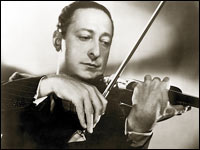 The Bell Telephone Hour, aka The Telephone Hour, was a long-run concert series which began April 29, 1940 on NBC radio and was heard on NBC until June 30, 1958. Sponsored by Bell Telephone, it showcased the best in classical and Broadway music, reaching eight to nine million listeners each week. It continued on television from 1959 to 1968. Throughout the program's run on both radio and television, the studio orchestra on the program was conducted by Donald Voorhees. Each 30-minute program generally features a guest singer or instrumentalist, with the Bell Telephone Hour Orchestra, conducted by Donald Voorhees, and the Bell Telephone Hour Chorus.
The Bell Telephone Hour, aka The Telephone Hour, was a long-run concert series which began April 29, 1940 on NBC radio and was heard on NBC until June 30, 1958. Sponsored by Bell Telephone, it showcased the best in classical and Broadway music, reaching eight to nine million listeners each week. It continued on television from 1959 to 1968. Throughout the program's run on both radio and television, the studio orchestra on the program was conducted by Donald Voorhees. Each 30-minute program generally features a guest singer or instrumentalist, with the Bell Telephone Hour Orchestra, conducted by Donald Voorhees, and the Bell Telephone Hour Chorus.After early shows featuring James Melton and Francia White as soloists, producer Wallace Magill restructured the format on April 27, 1942 into the "Great Artists Series" of concert and opera performers, beginning with Jascha Heifetz. The list of talents heard over the years included Marian Anderson, Bing Crosby, Benny Goodman, Nelson Eddy, José Iturbi, Oscar Levant, Lily Pons, Gladys Swarthout and Helen Traubel.
The series returned to radio in 1968-69 as Bell Telephone Hour Encores, aka Encores from the Bell Telephone Hour, featuring highlights and interviews from the original series.
- Bell Telephone Hour (Music from America) 44-09-04 096 Ezio Pinza.mp3
- Bell Telephone Hour (Music from America) 44-09-11 097 Marian Anderson.mp3
- Bell Telephone Hour (Music from America) 44-09-18 098 Oscar Levant.mp3
- Bell Telephone Hour (Music from America) 44-09-25 099 Lili Pons.mp3
- Bell Telephone Hour (Music from America) 44-12-18 111 Robert Casadesus.mp3
- Bell Telephone Hour (Music from America) 45-01-01 113 Fritz Kreisler.mp3
- Bell Telephone Hour (Music from America) 45-01-15 115 Ezio Pinza.mp3
- Bell Telephone Hour (Music from America) 45-02-12 120 Nelson Eddy (Pt 1 end clipped).mp3
- Bell Telephone Hour (Music from America) 45-02-19 121 Fritz Kreisler (end clipped).mp3
- Bell Telephone Hour 40-xx-xx (x) Guest - Robert Casadesus.mp3
- Bell Telephone Hour 44-08-20 (x) Guest - Nelson Eddy.mp3
- Bell Telephone Hour 44-09-04 (96) Ezio Pinza.mp3
- Bell Telephone Hour 44-09-11 (97) Marian Anderson.mp3
- Bell Telephone Hour 44-09-18 (98) Oscar Levant.mp3
- Bell Telephone Hour 44-12-18 (111) Robert Casadesus.mp3
- Bell Telephone Hour 45-01-01 (113) Fritz Kreisler.mp3
- Bell Telephone Hour 45-01-15 (115) Ezio Pinza.mp3
- Bell Telephone Hour 45-02-12 (120) Nelson Eddy (Pt 1 end clipped).mp3
- Bell Telephone Hour 45-02-19 (121) Fritz Kreisler (end clipped).mp3
- Bell Telephone Hour 48-03-22 (x) Guest - Arturo Rubinstein.mp3
- Bell Telephone Hour 48-12-20 (x) Guest - John Charles Thomas.mp3
- Bell Telephone Hour 49-04-25 (x) Guest - Lili Pons.mp3
- Bell Telephone Hour 56-11-19 (x) Guest - Renata Tibaldi.mp3
Here is a commentary from NPR Morning Edition, February 2, 2007 that you can listen to about Jascha Heifetz, who began the "Great Artists Series" on Bell Telephone Hour in 1942.
Shows on Archive.org






No comments:
Post a Comment